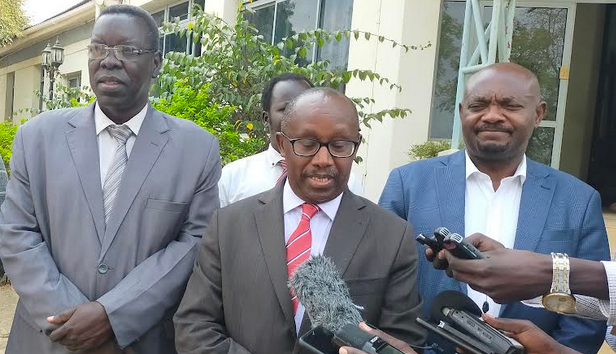The National Constitutional Amendment Committee (NCAC) on Monday submitted the Bank of South Sudan Act Amendment Bill and the Banking Law Act Amendment Bill to the Ministry of Justice and Constitutional Affairs.
Addressing journalists after submitting the two Bills, Gichira Kibara, the NCAC chairperson, said the two laws that govern the banking sector are very important in terms of ensuring that monetary policy and financial transactions are done according to the law.
“The Bills seeks to strengthen the Bank of South Sudan in terms of its independence and also its efficiency and effectiveness in regulating the banking sector. You are always aware that there is a risk of banks misbehaving and sometimes being fraudulent to the citizens so you have your account in the bank and the money is lost through the bank,” he said. “For people to have confidence in the banks, they must be properly regulated by the Bank of South Sudan which must have a legal provision that allows for proper supervision of banks so that when you put your money in the bank you find it when you need it.”
Kibara revealed that the two laws will also regulate the issue of foreign reserves and foreign exchange that has affected the country.
“The issue of foreign reserves must be regulated so that the dollar should not become a problem every time and there must be enough reserves in the Bank of South Sudan to ensure those who want to import goods can get the foreign currency,” he said. “So, part of the amendment addresses those issues to ensure that the Central Bank is strong to regulate monetary policy and also strong enough to regulate the commercial banks.”
Kibara also revealed that the NCAC is only left with only 5 laws to amend which they will complete in time when given the necessary support will complete. He said the Transitional National Legislative Assembly (TNLA) will need to work overtime to pass all the laws.
“The TNLA is well aware of the deadlines it is supposed to meet. They are behind the deadlines but we believe they are working very hard to prepare themselves when they resume and they may need to work overtime to make sure that they meet the deadlines,” he said. “But listening to the ones (parliamentarians) we interact with, they look committed to working overtime to make sure the Bills are worked on within that period.”
Meanwhile. Dr. Gabriel Isaac, the undersecretary in the justice ministry said the two laws are important for the banking systems in the country.
“This is something we are also proud of as South Sudanese that our laws are being amended to the international and regional standards. Everybody will also be happy to hear from the chairperson that these two laws will also regulate the issue of the dollar which all of us are very frightened of,” he said. “Those laws will also govern issues related to the local and hard currencies and everybody will be sure that when they put money in the commercial bank, there are laws that govern those rights.”
He said the justice ministry will expeditiously work on the two laws and submit them to the cabinet within the week.




